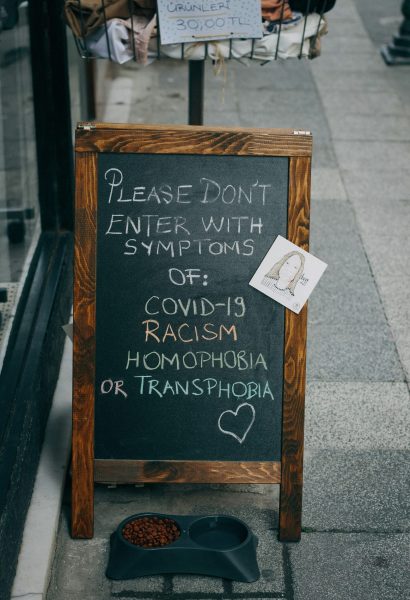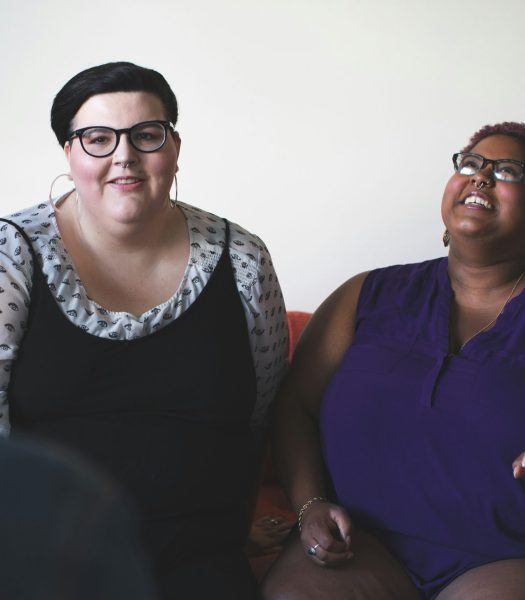What is Anti-Oppressive Therapy?
You might be reading this because you’ve seen the term “anti-oppressive therapy” or “anti-oppressive therapist” and are curious about what it actually means. In simple terms, anti-oppressive therapy is an approach that takes into account how systems like racism, colonialism, capitalism, ableism, homophobia, and transphobia affect mental health. Instead of seeing distress as something that only comes from within a person, it looks at how people are shaped by the world around them—and how those external experiences can deeply impact their sense of self.
Anti-oppressive therapy isn’t a specific method like CBT or EMDR. It’s more of a lens—a framework that guides how therapy is offered. It shapes the relationship between therapist and client, the kinds of conversations that happen, the language that’s used, and even what healing looks like. This kind of therapy isn’t neutral, and it’s not about helping someone adjust to fit back into systems that are already causing harm. That might sound surprising—after all, aren’t therapists supposed to be blank slates? But over time, we’ve learned that being completely neutral or detached isn’t always helpful, and in many cases, it can actually be harmful. Anti-oppressive therapy is about creating space where people feel seen, supported, and empowered to move toward more liberated, authentic ways of being.
It’s About Systems, Not Just Symptoms
Many people come to therapy asking, “What’s wrong with me?” But often, there is nothing wrong with them—something happened to them. Anti-oppressive therapy holds that a person’s distress may be a completely reasonable response to living in a world that wasn’t built with their safety, dignity, or joy in mind.
A trans teen might be struggling with depression not because they are inherently “sensitive” or “dysregulated,” but because they are navigating a school system that refuses to use their pronouns or protect them from bullying. A mother of colour may be experiencing burnout not because she’s “not resilient,” but because she’s carrying the expectations of caregiving, financial survival, and code-switching—all while being unsupported.
Anti-oppressive therapy doesn’t ignore these conditions. It sees them, names them, and offers space to imagine different ways of living.

What Does Anti-Oppressive Therapy Look like Therapy Room?
Traditional therapy models have often focused on diagnosing and treating symptoms with little attention to the social and cultural forces that influence mental health. While many of these approaches are helpful, they sometimes ignore how systemic oppression—like racism, ableism, transphobia, or economic inequality—can shape someone’s emotional world.
Anti-oppressive therapy makes power visible. It asks:
-
Who has access to mental health support and who doesn’t?
-
How do colonization, white supremacy, and patriarchy show up in our lives and even in therapy itself?
-
In what ways have people’s identities been pathologized or misunderstood by traditional mental health models?
A therapist working from an anti-oppressive framework isn’t just a neutral professional—they’re actively aware of how these forces show up in the room. This awareness changes everything: the language that’s used, the assumptions that are questioned, and the way safety and trust are built. An anti-oppressive therapist listens closely to what you actually need—not just what society says you should need. They help name the real sources of pain. Maybe it’s an unhealthy relationship, or maybe it’s the slow burn of systemic racism or ongoing microaggressions at work. Either way, those things matter here.
Why Does Having an Anti-Oppressive Therapist Matter?
If you’ve ever felt dismissed, misunderstood, or invisible in therapy, anti-oppressive therapy offers a different path. It’s not just about healing pain — it’s about healing in a way that affirms your worth, validates your lived experience, and acknowledges the strength it takes to survive in a world that hasn’t always been just.
For many clients—especially those who are queer, racialized, disabled, neurodivergent, or otherwise marginalized—therapy can be a space of retraumatization when it ignores power dynamics. Anti-oppressive therapy offers a different possibility: one where clients are not seen as problems to be solved, but as whole people navigating complex worlds.
At its core, anti-oppressive therapy asks:
- What if your struggles aren’t a sign of your failure, but a reflection of your resistance?
- What if healing means not just adapting, but imagining new ways of being altogether?

What Does Anti-Oppressive Therapy Look Like in Practice?
In anti-oppressive therapy, your therapist is actively reflecting on their own power, privilege, and social identity, and how that shows up in the room with you. They might name differences—like being white, cisgender, or able-bodied—and acknowledge how that shapes the therapy dynamic.
This kind of therapy invites real conversations about race, culture, gender, and systems of power—not just personal struggles in isolation. It’s not about following a rigid format. One session might explore the weight of generational trauma or racism, while another challenges a diagnosis that doesn’t quite fit.
Here’s what you might notice in practice:
- Your identity is centered. You won’t be asked to leave parts of yourself at the door.
- Systems are named, not just symptoms. Struggles like burnout or imposter syndrome are seen in context—not as personal failings.
- Collaboration over hierarchy. Your therapist isn’t the expert on your life—you are. Sessions are built around shared power and consent.
- Honesty about privilege and power. Therapists name differences and stay accountable through their own reflection, supervision, and ongoing learning.
- Openness to feedback and repair. If something feels off or harm happens in the room, it’s named and addressed with care.
- Respect for your lived experience. Your insight into your own life is treated as essential—not secondary.
Anti-oppressive therapists know they’re part of the same systems we’re all navigating, and they stay committed to doing their own work—not just ticking a box for “cultural competence.”
Therapy That Affirms Identity and Lived Experience
Many people, especially those from marginalized backgrounds, have experienced therapy as a space where they needed to educate their therapist, explain cultural norms, or downplay important parts of who they are. Anti-oppressive therapy flips this dynamic. It affirms the client’s full humanity, complexity, and strengths. It says:
- Your anger at injustice is not pathological.
- Your survival strategies make sense in context.
- Your cultural, spiritual, and communal sources of resilience matter.
Here are some examples of an anti-oppressive framework in action:
- A Black client grieving the loss of a community member to police violence may be navigating not only personal grief, but the collective trauma of systemic anti-Black racism. An anti-oppressive therapist recognizes that the client’s anger, fear, or numbness are valid responses to repeated, racialized harm—not something to be pathologized or “regulated away.” Therapy may include space to process the weight of racial injustice, resist respectability politics, and reconnect with sources of community, safety, and ancestral strength.
- A trans client exploring gender identity may be working through trauma, seeking gender euphoria, or navigating unsafe systems. Anti-oppressive therapy affirms their identity, recognizing the emotional labor of existing in a world that often misunderstands or harms them. Therapy becomes a space of safety, self-definition, and embodiment—guided by the client’s own pace and wisdom.

Honouring Intersectionality
People’s experiences of oppression are never one-dimensional. Anti-oppressive therapy is deeply rooted in intersectionality, the understanding that systems of oppression don’t act independently of each other. A Black, disabled woman will navigate the world differently than a white, able-bodied woman, even though both may experience sexism.
Similarly, a queer client processing religious trauma may be untangling years of shame, fear, and internalized homophobia from faith communities that once provided belonging. Anti-oppressive therapy acknowledges that the harm wasn’t just personal—it was systemic, rooted in power structures that used spirituality to marginalize. Rather than rushing toward “forgiveness” or detachment, therapy makes space for grief, anger, and complex identity—perhaps even the reclamation of a spiritual life on the client’s own terms.
These nuances matter. When therapy only focuses on symptoms like anxiety or depression without acknowledging these roots, it can leave clients feeling unseen—or worse, pathologized.
Is Anti-Oppressive Therapy Right for You?
If you’ve ever felt like traditional therapy didn’t quite land—if you’ve had to constantly explain your identity, culture, or experience—anti-oppressive therapy might feel like a breath of fresh air. It treats your context as central, not as an afterthought. It’s not about ticking boxes or finding the right label. It’s about real connection and a commitment to justice.
Finding the right therapist is always personal. But if you’re looking for someone who shows up with honesty, curiosity, and a drive to challenge the status quo, looking for a therapist who works from an anti-oppressive therapy lens could be what will work for you.
And if you’re in Vancouver or online and looking for a therapist who works from this lens, you’re not alone, and we would love to support your mental and relational health journey.



